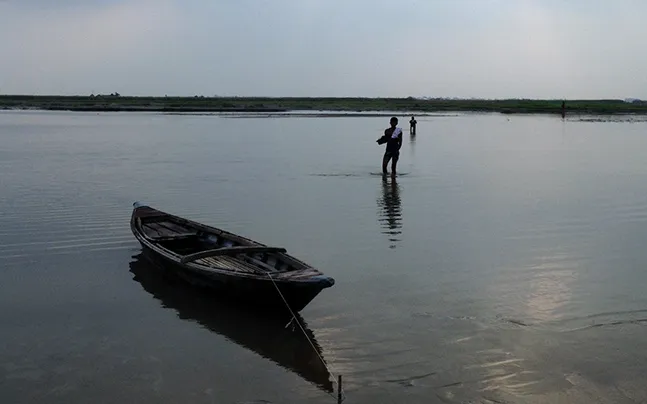-
CENTRES
Progammes & Centres
Location
The Teesta is a major source of sustenance for India and Bangladesh as agriculture has evolved in the catchment areas of the river in both the countries.

The uncertainty surrounding the visit of Bangladesh Prime Minister Sheikh Hasina has given rise to much speculation and conjecture. One of the main reasons, it appears, is that India and Bangladesh have failed to arrive at an agreement over sharing of waters of the river Teesta.
Even in 2011, during former Prime Minister Manmohan Singh's visit to Bangladesh, the two nations were set to sign a water sharing pact, but at that time West Bengal Chief Minister Mamata Banerjee objected to the formula agreed upon. In the draft, the two sides had agreed on a 50-50 water sharing ratio during lean season. To Mamata Banerjee, this was against the interests of her state. Since the Teesta originates in Sikkim and flows through West Bengal before entering Bangladesh, the consent of the state government is essential. Even the Constitution places water under the state list. When negotiations couldn’t break the impasse, the issue remained pending.
In spite of the steady growth in India-Bangladesh ties in the past few years, the non-resolution of Teesta waters has been a sore point. The trade and economic relationship is booming. India has given duty-free access to all products made in Bangladesh and provided $3 billion as economic aid to its neighbour for development of infrastructure.
During Sheikh Hasina's visit, the two countries were expected to sign a raft of agreements on a wide range of issues including infrastructure development, trade and investment and military cooperation. All these positives couldn't move forward as the non-resolution of the Teesta issue continues to attract attention in the popular discourse and is a cause for much heartburn in Bangladesh.
Water is an emotive issue in Bangladesh as the people's lives revolves around rivers. The Teesta is a major source of sustenance for India and Bangladesh as agriculture has evolved in the catchment areas of the river in both the countries. To support agriculture, the two nations have constructed barrages: In India at Gozaldoba and in Bangladesh at Dalia.
Bangladesh has been complaining that it doesn't get enough water during lean season as the barrage upstream in Gozaldoba draws water unilaterally leaving very little for Bangladesh. Besides, riparian concerns (relating to the natural course of a river) have also made Bangladesh pitch for a viable agreement, since dams are being constructed upstream in Sikkim. They fear that this might alter the Teesta's flow further.
In the context of India-Bangaldesh ties, the issue becomes even more sensitive. There are many historical reasons for this. To begin with, Bangladesh perceives India to be harbouring a Big Brother syndrome. Secondly, its experience with the Farraka barrage (which allegedly caused water shortage downstream, a charge India denies) further deepens Bangladesh's apprehensions. Finally, its relationship with India has been fodder for much political chest-beating in that country.
The Opposition accuses Sheikh Hasina of being pro-India and often overlooking the interests of Bangladesh. The non-signing of the Teesta is considered her failure. In Bangladesh, every bilateral visit with India is measured on a strict barometer of gains and losses, and the signing of the Teesta pact has itself become a benchmark. Besides, Hasina has been facing criticism for the growing radicalisation in the country. With the elections likely to be held in 2019, the resolution of the Teesta issue is crucial for her to thwart further criticism.
One hopes the two countries recognise each other's limitations and work for a win-win solution.
This commentary originally appeared in Hindustan Times.
The views expressed above belong to the author(s). ORF research and analyses now available on Telegram! Click here to access our curated content — blogs, longforms and interviews.

Joyeeta Bhattacharjee (1975 2021) was Senior Fellow with ORF. She specialised in Indias neighbourhood policy the eastern arch: Bangladeshs domestic politics and foreign policy: border ...
Read More +